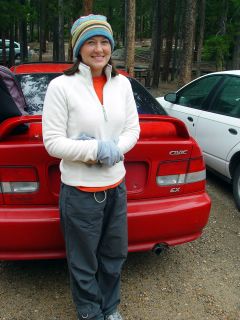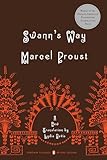Overlyconscious tagged me with a "challenge" whimsical and effortless enough to be fun. I'm supposed to journey into the past, crack open the blog's vault, and extract the fifth sentence from my 23rd post. I invite you to join me as I embark on this historical expedition. What will I unearth? I'm almost reluctant to find out...
::
Well, this was a little anticlimactic. My 23rd post was a photo from a trip to the Grand Canyon. The caption reads, "A well-adjusted group of hikers." Some of the other shots in the travelogue were pretty good but this specific one is not too remarkable. There's not even much potential for retro-fitting my "statement" to make it eerily fitting today. I'm disappointed.
However, I'm sure some of you will want to try it. Consider yourselves tagged, but know that you won't hurt my feelings if you opt out. An opportunity for self-analysis awaits you...
Tim
WholeWheatBlogger
English, August
Paula
Camille
::
Want to know how to tag?
1. Go into your archives.
2. Find your 23rd post.
3. Post the fifth sentence (or closest to it).
4. Post the text of the sentence in your blog along with these instructions.
5. Tag five other people to do the same thing.
Monday, October 31, 2005
Underwhelming Wisdom of the Past
Posted by
AJ
at
11:03 AM
6
comments
![]()
Saturday, October 29, 2005
Lost in the Park

Yesterday was Lindsay’s birthday, so we left the computer to collect dust (if it was a Mac we would have buckled it in, bought it a milkshake, and brought it with us) and headed out to our favorite state park.
The park is named Wallace. It does not look especially Scottish, and in lieu of the lack of heather, rills and misty valleys, we think that someone on the naming committee got confused. However, Wallace State Park does tend to serve up very satisfying woodland panoramas, and we always find new angles to fuel our photography.
The Park’s trail system is also very endearing, especially on fall afternoons when the sun has a warm, dusty smell. The various trails circle up behind you, slowly surround you, and force you to stop and stand in a pile of leaves. Then the orange and gold trees whisper something to you, something about stopping and taking a nap. You compromise by taking gratuitous numbers of photos. 
The trail system is very poorly labeled. If you start in from the correct end, the maze makes a sort of lackadaisical sense—as if a slightly inebriated groundskeeper (Wallace?) stumbled through the woods, tacking up markers when the fancy took him. But the correct end of the system is not near the parking lot—and not being ones to waste time, Lindsay and I always just start in.
This has a way of lengthening the duration of our hikes. Yesterday our trail angled up and over a small ridgeline and across a creek. Faced with a three-pronged intersection, we opted for one that would take us away from the “Deer Run Loop,” an extra 1.5 miles that we’ve hiked in the past. Before the afternoon was over, we had hiked the Deer Run Loop twice—we think.
It was something like what Bilbo Baggins said: “It's a dangerous business, Frodo, going out your door. You step onto the road, and if you don't keep your feet, there's no knowing where you might be swept off to.” Except in this case, the danger kicks in when you enter the Wallace trail system. The paths reach out leafy little fingers and grab you. You enter the trees knowing these trails take on a life of their own.
Connections could be made here. I won’t actually make them, but… When the trail forks, and it’s poorly labeled, you experience a sense of irritation, of necessary knowledge being yanked away. You feel that Wallace, for all his redeeming qualities, has taken things a little too far. That’s why it’s surprising to discover the strange freedom that accompanies getting lost. Life with Christ, we think, is like this. Intriguing, beautiful, and ultimately unchartable. We're all walking in this huge park, several switchbacks out from Eden.
Not that we’re complaining.
Posted by
AJ
at
11:05 AM
4
comments
![]()
Thursday, October 27, 2005
The Christian Cocaine?

For the last few days, walking outside has been a kind of therapy. Crisp air and sylvan fireworks have conspired to make life seem better. My Theology 1 professor likes to refer to natural beauty as "the Christian cocaine," and I see where he's coming from. Creation is addictive. It's also transportive. If you look too closely at the beauty surrounding you, you may lose track of where you are, start thinking you're someplace better. Truth is, you might just regain your bearings long enough to remember where you really are.
On days like this, I go outdoors and see "theology" unpackaged before my eyes:
By taking a long and thoughtful look at what God has created, people have always been able to see what their eyes as such can't see: eternal power, for instance, and the mystery of his divine being (Romans 1:20, The Message).
A red-leafed tree can make the thought of True Reality flare to life. I enter Autumn, and wish for the "undiscovered country." Creation rewires my mind, if only for a moment, and I thank God for how his scenery sends us.
Posted by
AJ
at
4:19 PM
6
comments
![]()
Wednesday, October 26, 2005
Blue Like Jazz by Donald Miller (Book Review)
Review: Existential Theology, Strong Voice & Comics Update: After reading Blue Like Jazz a second time, and having mellowed out a little, I'm upping my grade to a very strong A. However, you can read my original (unaltered) review below.
Update: After reading Blue Like Jazz a second time, and having mellowed out a little, I'm upping my grade to a very strong A. However, you can read my original (unaltered) review below.
A couple weeks ago, Andy overheard me wishing out loud for a copy of Donald Miller’s book, Blue Like Jazz—and being the generous, resourceful guy he is, he sent me a copy. The book has generated some buzz among “spiritual” types, and as I told Andy, I was eager to take a look, although the investigation would have to wait until my Christmas break.
That’s what I thought. But in a mysterious process I don’t fully understand, I somehow read the book last week. I’m not sure when I did it. It just happened. So here are some thoughts, about two months ahead of schedule.
First off, I need to say I liked Miller’s approach. The subtitle of Blue Like Jazz is “Nonreligious thoughts on Christian spirituality.” And being a pretty nonreligious guy myself, I was glad we were dispensing with “cultural Christianity” from the get-go.
Miller proceeded in classic postmodern fashion. His language is stripped down and very experiential. Borderline touchy-feely. He goes about his task in the existential manner—working from observable phenomena and, especially, feelings about the way things are. He also has a knack for translating theological truth into simple ideas and experiences; his tone is self-deprecating and flat-out earnest. Miller is just the guy on the street, trying to figure things out. No brighter or better than the next man.
By taking this approach, Miller clearly defuses a lot of the criticism that is traditionally leveled at Christianity. He positions himself as a friendly stuffed animal (Don Rabbit?), and honestly, it’s hard to feel like taking a shot at such an amicable creature.
However, I think Miller unintentionally raises the question of how far we should go in our efforts to placate our culture. Characterizing Christianity as nonsensical and silly but somehow effective (as Miller does) may defuse opposition, but I’m not sure it does God any favors.
An angle I found fascinating was the subtle similarity that Blue Like Jazz bore to G.K. Chesterton’s Orthodoxy. Miller quotes Chesterton, and the “spiritual journey” theme Jazz employs bears some similarity that of Orthodoxy. But while Chesterton sketches Christianity as paradoxical and preposterous, precisely because it is divinely true, Miller paints the faith as ridiculous and unfashionable—“but it somehow works.” I can’t help feeling like this conclusion misses a key element from the brilliant G.K. equation. At the same time, it might be overly simple to say that Miller lacks intellectual self-respect. I think his approach is very deliberate.
Miller aims for a narrative that is undeniably “soft” in that he doesn’t want to be labeled as a guy making dogmatic truth claims. The problem is, to espouse belief in Christ, he has to. And he eventually does, writing with candor about the cross, sin, heaven and Satan. I was relieved when the book reached this juncture, having feared that Miller was opting for the quicksilver approach epitomized by Brian McLaren. I was so happy that Miller had a backbone. However, when he revealed that he actually did believe in “sin,” I was almost surprised. I wondered whether, if I was a non-Christian, it would feel slightly like bait and switch. Was the overtly “postmodern” binding really suited for the message?
I sometimes felt like Miller’s healthy emphasis on Christ’s compassion and tenderheartedness came somewhat at the expense of divine logic. The characteristic postmodern/“emergent” approach is to say true things in a way that makes them seem less than authoritative—and thereby, the idea goes, less offensive. I’m still wrestling with the scheme. Miller’s undisguised leanings toward political liberalism should also be mentioned here, if only as a point of reference.
This review may come off as fairly negatively charged, which would be misleading. Miller irritated me here and there with a failure to make crucial distinctions, or with an overly simplistic take (Was Jesus a hippy? Is discipline of any kind inherently fake?) but I was also prodded and inspired by various things he said. His word pictures are often highly memorable. The connections he makes between “Christian spirituality” (his catchphrase) and life are often refreshing. Miller communicates vital insights about existence in enjoyably straight-up language. He can also be pretty funny.
To top it off, I also felt some empathy for Miller’s writing style. I’m not saying I’ll attempt to flat-out mirror it, but I saw some things I liked. He’s blunt at the right moments, loves a good story, and spits out eye-openers with a nice sense of timing. I found myself wanting to like him. And I do. I just have reservations. All told, the length of this review may be the best proof of the affinity I feel for Miller’s approach and tone in Jazz. We agree on a lot.
Would I recommend this book to anyone? Just about. Will I sell my copy online? Absolutely not. And that, as far as I’m concerned, is a pretty good testimonial.
More Donald Miller quotes
Listed on The Master Book List.
Posted by
AJ
at
1:52 PM
8
comments
![]()
Tuesday, October 25, 2005
Cool For Hire
Things were going smoothly yesterday, going really well, until the class discovered I actually knew how to do algebra. After that I was the featured commodity. It was hard work, but my stock rose accordingly.
“What is three times sixteen?”
The young philosopher who had posed the question furrowed his brow, eyes slightly squinty. His sidekick, with smooth pragmatism, reached for his calculator.
I considered. “Forty-eight.”
They looked at me in awe. The pragmatist muttered, “He said it before I could even punch it in…”
Later, students talked about my cool shoes, my cool Guy Pearce resemblance, my general coolness. It’s amazing what paying attention in school has done for me.
::

In the right light, my car appears to be a yellow Honda Passport.
The day was not without its minor roadblock, however.
A student’s chances of landing a detention from me are not too far removed from his odds of winning the lottery. However, in one of my classes was a former detention winner who had beaten all the odds and received a slap on the wrist. He vowed that he would have his revenge—later, of course. That’s the cool line in high school; “I’ll make you pay for that…later.” Sure, fine, as you say.
A few minutes later the audacious youngster asked me what kind of car I drove, and not being one to hold a grudge, I said, “A Honda…” Then I had another thought. “A yellow Honda Passport,” I quickly amended. Nearby students quickly affirmed the wisdom of concealing my vehicle’s true identity.
I’m just hoping that Mr. I’ll-get-you-for-this will grasp the distinction between sarcasm and lying. It would break my heart to be accused of deception and unjust reprisal.
Posted by
AJ
at
3:53 PM
6
comments
![]()
Monday, October 24, 2005
Spiritual Prayer in a Physical World
How Does Prayer Hit the Asphalt?

In Pray Harder! Are We Playing Spiritual Politics? I posed several questions for us all to chew on. Some of them were:
If I don’t get what I ask for, was it my fault?
Does my faith, or the lack thereof, directly regulate God’s answers?
What does it mean to pray “according to God’s will?”
I asked the questions because prayer is an element in our spiritual journey that will never be less than vital.
As I considered my own response, I realized the issue was already becoming denser. The initial question—How does spiritual prayer interact with God’s will?—was beginning to wind off in several related-but-different directions.
I felt, as I sat down to write this, that I could follow one of several trails. 1) A discussion re: faith as an ingredient in answered prayer would be very fitting. But then, I could also talk about the 2) specificity or non-specificity of our prayers—should we pray in general terms, or take aim at explicit outcomes? A hand grenade or a sniper-rifle effect? Then again, the issue of 3) discerning God’s will and then praying “in the center of it” seemed very pertinent.
Where to go? Should I head down trail 1, trail 2, or trail 3? As usual, in these instances, the right answer seemed to be Yes.
This won't be easy, and it may not be pretty, but I’m going to try and meld the three above areas together in my answer.1 So how does spiritual prayer interact with God’s will? Well,
Prayer must be powered by faith, fueled by a free-ranging desire for God’s work to be done, and underlined by the understanding that we don’t see God's mind with x-ray vision.
I like the way that sounds. Very clean, very flowing. I almost want to leave it at that. But I guess I need to break down my topic sentence a little more. So, spiritual prayer must be...
A. Powered by faith...
The faith issue, as highlighted in James 1:6-8 (“Ask boldly, believingly, without a second thought…”) is unavoidable. Prayers can only be launched from the foundation of divine sovereignty, a big-picture trust. Praying to God without relying on his power, love, and compassion has all the effect of Irish luck. It’s humorous superstition, nothing more. I’m about to argue, however, that while dithering prayers lead straight to non-results, the relationship should not be inverted too quickly. Nothing happened when you prayed—because your prayer was weak-in-the-knees. This is too simple.
B. Fueled by a free-ranging desire for God's work to be done...
Praying with God’s will in mind means at least two things. One, we had better not ask God to bless our murder attempt with success or load us with gratuitous bling (limitations on the wish-list). Two, anything that conceivably could lead to God’s honor is fair game.
The second assertion may sound cavalier, but it isn’t. In the Bible, we find God inviting his people to air their personal concerns to him unreservedly: family concerns, money concerns, health concerns. God enjoys responding to his people, showcasing his ability. Elijah prayed for better weather. Paul asked God to remove his crippling disability, his “thorn in the flesh.” Jesus asked his Father to withdraw the necessity of the cross. Does this freedom, this childish initiative, extend to everything? Parking spaces? Locked apartment doors? I think so—with the acknowledgement that motive is central.
C. Underlined by the understanding that we don’t see God's mind with x-ray vision.
This may be the toughest sell. The question is, To what extent can we see, comprehend, assess-with-affirming-“hmmms” God’s specific, absolute will? To an adequate but not overpowering extent, I think. I would suggest that God’s unswerving, non-negotiable will for our lives, in terms of our knowing it, can be found in one place—a book. We could say that God’s will (again, in the absolute, perfect sense) involves our not knowing it completely—and living in light of this fact.
The dilemma is as follows.
- We want to pray according to God’s will.
- God’s will is in the Bible.
- But the Bible doesn’t mention my calculus test.
We want to honor God, want to obey him, but our sight is blurry, and God knows this. He intends it, for now. Therefore, as we pray, we exercise childish initiative—with the acknowledgement that our requests may not be answered as planned. We are free to fail in prayer. We can be assured, however, that God receives our requests and takes them into account. Having foreseen them before he framed up planet earth, he has long since factored their weight into his reckoning.
As followers of Christ, we are free to ask for his help in world-changing, day-changing, heart-changing ways. And in the end, if God answers my prayer for an unlocked door or a defogged mind, it can hardly be a trivial event.
:: end ::
Ironically, the briefer a piece like this is, the more potential there is for causing distress and irritation. I tried to keep this short, so I'll be happy to unpackage any aspect of it. (Then we can discover whether you misunderstood me, or
For those of you still mulling the original question over, I hope you persevere. As easy as it is to let the issue slide, I think the high dividends make the mental wrestling worthwhile. Feel free to append your responses and backlinks to this post or the previous Pray Harder! piece.
1 I realize that the phrase “my answer” is a little ironic, seeing as what I’m trying to do is simply take God at his word. “My answer,” therefore, should be understood simply as the Christ perspective, as related in the Bible—as clearly as I can make it out.
Posted by
AJ
at
8:12 PM
2
comments
![]()
Sunday, October 23, 2005
Pray Harder! Are We Playing Spiritual Politics?
A Call for Interaction

A couple days ago I inadvertently brought up an issue that caused a small—well, very small—firestorm. It was more of a momentary flare-up, really. But in the comments following Spiritual Journey: Risky Prayer & Coercive Modesty, a provocative issue arose. Encapsulated in a question, the dilemma is
How does spiritual prayer interact with God’s will?
Fleshing the problem out, we could ask:
If I don’t get what I ask for, was it my fault?
Does my faith, or the lack thereof, directly regulate God’s answers?
What does it mean to pray “according to God’s will?”
Fundamental to the problem was the sensation that it may be simplistic to simply say, “Your prayer was not answered because of your puny faith.” At the same time, we have to come to terms with the fact that this may be the case.
As James wrote, “Ask boldly, believingly, without a second thought. People who ‘worry their prayers’ are like wind-whipped waves. Don't think you're going to get anything from the Master that way, adrift at sea, keeping all your options open” (James 1:6-8, The Message).
How do we resolve this seeming impasse? More fundamentally, what does it mean to pray in faith, to pray spiritually, in a way that honors God? How specific should our prayers be? How specific should be our expectations of response?
I’d like to invite anyone who’s interested to blog on this topic. Your post need not be exhaustive. (Although it might be if you’ve read Providence and Prayer…) I’ll post on the question as well. The additional challenge, of course, is to not merely formulate our own thoughts, but to do so in a way that corresponds with God’s word on the topic. Our takes will need to mirror spiritual truth. Unless, of course, you’re an open theist. In that case, you may as well say whatever you like.
The mic is open.
When you write your piece (and I hope you will!), please post a link in the comments section, and, if you would, link back to this post as well. I’m hoping for some energizing interaction... Is it possible that we might start praying more as a result?
Posted by
AJ
at
4:28 PM
11
comments
![]()
Saturday, October 22, 2005
Spiritual Journey: Google and Self-Knowledge

"WHO AM I?" A Google Desktop query can find a lot of answers—just not the most important ones.
I’m a sucker for new Google toys. I use Gmail (and I can send you an invite if you want). I have several accounts, actually. Just last month, I signed this blog up for Google’s new site mapping service. A few weeks ago I downloaded Google Talk. If Google opened a restaurant, I would probably go there.
So it perplexed me a little when the new Google Desktop system took forever to index my computer. The idea is cool. Google Desktop crawls your whole computer, including email, online chat sessions, pictures, web history, and indexes everything. Then, instead of using the stupid Windows search function, you can pull up Google-style results in a matter of seconds. You start typing in your phrase and the file results appear as you type, sorted by variety, date, etc. Sweet.
But it took over a week for Google to index my computer so I could start enjoying the new tech rush. Day after day, the little status bar would say, Indexing 17% complete, Indexing 35% complete, etc. Once it reached 62% and I got excited. But every time I shut the computer down or reloaded programs, the indexing would start all over. It was distressing, to say the least.
It was also, I thought, kind of like my own attempts at self-assessment.
Every so often, the idea arises that I am getting to know myself pretty well. I suppose I think this idea, although it seems like it is self-regenerative. It keeps on walking in, although I don’t remember inviting it back. Yeah, you know yourself all right, it says. You know what makes you tick, what makes you struggle, and how to get through it. You have yourself figured out. I find that it’s fairly comforting to believe this, like holding my fate in my own hands. Like I've charted out the central feature of my spiritual journey.
But my fate, apparently, is slippery. This is where the Google thing comes in. I’m “crawling” my own personality constantly, indexing my thoughts and motives, and yet, they are constantly changing. I think I have myself scanned pretty well, and then, without warning, I realize the self-assessment process has just begun all over again. My level of self-knowledge never reaches 100%.
I find that my knowledge of me is somehow limited. The fact that I’m living my life encroaches on my chances of understanding it. As creatures, we are not really self-monitoring. It takes a higher intelligence to really understand us. As Augustine wrote,
I placed myself behind myself all the time. You took me from behind myself, put me in front of myself. I saw myself and was horrified. - St. Augustine
In simple language, Augustine points up a profound paradox: Because I am me, I cannot look in on myself. I don’t have the perspective. Only God has that. Therefore, the degree of my self-knowledge will depend upon my reliance on God’s perspective. To understand myself, I must trust someone else. Looking at my heart requires the perspective of divine eyes—even if the revealed picture is not exactly pretty. I sense that this is absolutely essential. It’s like G.K. Chesterton says:
To the question, “What are you?” I could only answer, “God knows.” And to the question, “What is meant by the Fall?” I could answer with complete sincerity, “That whatever I am, I am not myself.”
The simplest statements about ourselves require knowledge that we do not innately possess. It would not occur to me to posit that I am “made in the image of God.” Or to suggest, in the words of Pierre Teilhard de Chardin, that “We are not human beings having a spiritual experience, we are spiritual beings having a human experience.”
Crawling the cracks and chasms of my own mind would never reveal these truths to me, and it’s essential to my mental health that I remember this. Knowledge of our true worth, our identity and “fate,” cannot be self-disclosed or self-invested. There is no Google Mindframe. In this sense, Google has me beat.
The Google Desktop finally finished scanning my pc when I accidentally left it on all night, but I’ve been scanning myself for almost three decades now, and the process is never over. Maybe the real answer is staring me in the face: If I throw up my hands, and relinquish the technical control I seem to crave—if I accept the necessity of this strange and childish trust—where might it lead?
I have a guess that, for starters, it might show me how I’m supposed to live. God knows me perfectly, tells me everything I need to know. One word from him, a word like “child,” could have unexplored worlds of implications. That’s why life continues to be this spiritual journey—featuring me as one of its mysteries. Someone can read my blueprints, dissect them right down to the point where spirituality intersects with basketball, both strangely colored with this instinct to talk smack—strange, yes, but somebody gets it. And he’s not me.
Posted by
AJ
at
6:34 PM
5
comments
![]()
Friday, October 21, 2005
Show Us Jesus :: 3

Chapter 3: Reception
(Chapter 1:Comprehension. Chapter 2: Apprehension.)
Our souls make beggars of us, if we’re honest enough to call a spade a spade. You could use the word “comprehension” to describe the act of discovering that our inner needs are irreducible. We get the job, we get the car, we get the threads—or we deride them all—and something is still wrong, but it’s not material. The missing rung is invisible, but we can’t get past it. Something we were meant to have, maybe a vital part of us, is gone. Missing. And once curiosity or desperation drives us to ‘fess up, other facts emerge.
We sense reality fooling us with its appearance of completeness. Maybe all we see is rocks and skyscrapers, but we believe we’re not alone. We feel inexplicable transcendence in an urban jungle, or we walk up a mountain and have the strange sensation of standing under Someone Else’s microscope. The realization may be inspiring or horrifying, but we begin to suspect Someone unseen is nearby. We see the clues—glimpses of glory, shards of beauty—and start tracing them back to their source. We put a hidden face with a name: Jesus Christ. You could call this spiritual detective work “apprehension.”
So what next? Have we come so far, only to satisfy ourselves with little grocery-store-samples of God?
::
In the final chapter of this story, the operative word is “reception,” because Jesus meets us, no matter how hard we search, how long we pray—he comes to us, arriving at the perfect time and place. He receives us. It’s like George MacDonald wrote in Phantastes:And a great hand reached out of the dark, and grasped mine for a moment, mightily and tenderly. I said to myself, “The veil between, though very dark, is very thin.”
We discover that Christ is never as far away as he seems.
::
Our Story
Chapter 3: The Master’s Campfire (John 21:9-12)
Peter scrabbled up the surf line, half-crawling half-lunging, the sea streaming off him, and he heard Jesus laughing—just like he had those long days in the dusty Galilean sunshine. There was salt water running down Peter’s face, but most of it came from his eyes.
He came and stood by the campfire, across from Christ, and Jesus made him sit down. They didn’t say much at first, just looked each other over, the fish sizzling, the ocean dripping off Peter. Jesus had a half-smile in his eyes and Peter had a half-smile in his heart. It was the missing half of that smile, Peter thought, that kept them from talking. The excited cries of their friends rushed closer, and moments later the boat was grating on the sand, and the rest of the little crowd came running up. JESUS! JESUS!
They were yelling and bellowing when they jumped out of the boat, but when they got near the fire, they just threw themselves down on the sand next to Jesus, crouching and staring like good dogs. Their joy was infectious, and Jesus was with them in an instant, giving bear hugs, backslapping, demanding their biggest fish to throw on the fire, Right now, so we can eat together! Well, what are you waiting for?!
Peter watched the irrepressible laughter, the explosive wonder that was changing his friends into hysterical little children—and he felt it all too, he was laughing and crying along with them. But the sharp edge of that half smile was cutting into his heart. And Jesus knew it.
Soon, he knew, Jesus would turn to him, and they would speak together, about something that only the two of them understood completely. That moment of yawning emptiness, the ghoulish cry of the bird on the rooftop, the weight of three lies stacked in an impetuous heart. It would be awful, Peter knew, and he dreaded it. It would be horrible, and he couldn’t wait for it to happen.
Jesus had never forgotten the betrayal—he saw that now. Jesus had come all the way back from death, and he hadn’t forgotten. He had come back, Peter prayed, to make everything new. Yes. He had returned, Peter believed, to wipe the slate clean. Christ was looking at him now, holding out a smoking slab of fish and roasted bread. Jesus stepped over, smiling that smile, and Peter almost shivered, but he felt joy welling up. Nothing would come between him and this God again.
::
Sometimes I read the gospel accounts, and it's as if they take place on an alien landscape. I’ve never seen the sea of Galilee, true. I’ve never walked through the gates of Jerusalem—but that’s hardly the point. I read the stories of Jesus and Peter and their beauty stabs me in the heart. I think, If only… If only Jesus and I could speak that way.
But we can. We do.
And here’s where the writing gets hard. The moment Peter had on the beach—that moment happens for us as well. Perhaps it’s just for an instant, but God has come near—we’ve seen him, felt him. He feeds us. We walk with him for awhile, and he changes us into worshippers. Often, it means that the darkness residing in our souls is dredged up. We know that Jesus knows about it, as soon as we apprehend his presence. And then our next step is awful and joyful and clear.
But how can we quantify this experience? To put it into words adequately, I’m convinced, is not possible. Only those who have been there can say what it’s like to have breakfast with Jesus. Nonetheless, we try to express it. Some of us spend a lifetime trying to choke it out. And I might try too, if I had time and space enough. I just did try, in fact. But the task is, beautifully, too hard. Speaking about it, C.S. Lewis wrote,There is a kind of happiness and wonder that makes you serious. It is too good to waste on jokes.
And to this I say yes. Yes, exactly. But perhaps Christ himself said it best. As he told his perplexed disciples, “I have food to eat you know nothing about” (John 4:32). He didn’t even try to explain the clandestine meetings he held with his Father, and this was divinely wise, because ultimately, all explanations fail—even though the meeting changes us.
I’ve often thought:
The breakfast Peter had with Jesus that morning did not fade. Peter never forgot it. It was always there, in the back of his mind, the morning he looked up, and Christ was waiting.
Peter’s life would be like the terrain of Galilee, where Jesus walked with the disciples. Galilee is hill country, the roads weave up and down through crags and ridges; one moment you see the destination clearly, the next it’s absolutely hidden, and all you can do is breathe the dust and wait for the next hilltop. Peter’s life is like ours, is what I’m getting at. But one thing was constant.
Peter learned to see the unseen. And he followed Jesus all the way home. Peter walked through the EXIT door of his own cross to get there, and didn’t care—he tracked Jesus all the way home to another meal, where Christ would welcome him and never leave. When we follow Jesus, we look forward to the same. What was it Paul said?I’m not saying that I have this all together, that I have it made. But I am well on my way, reaching out for Christ, who has so wondrously reached out for me… I’ve got my eye on the goal, where God is beckoning us onward—to Jesus. I’m off and running, and I’m not turning back (Philippians 3:12-14).
Likewise, our story with Christ is not finished. The book is still being written; it is an adventure, and the trail runs ahead. Obedience, as Peter learned, leads us closer and closer. This, I think, is the final word. George MacDonald wrote:And if you would know Him so that He cannot escape you, and you would find Him everywhere, wherever He was, in the midst of a crowd or on the hilltop, do what He tells you, and He will go on helping you go on and on, till at last you shall see His very self. – Proving the Unseen
In the end, we will see Christ face to face, be like him at last. The perfect view will make us perfect too. Until then, we hurry from comprehension, through apprehension, to reception. We run toward Jesus; we lose sight only to rub our spiritual eyes and find him again.
Always, our need is present.
Always, glory is visible.
Always, Christ waits.
::
This is the last post in a three-part series. Show Us Jesus 1 Show Us Jesus 2
Posted by
AJ
at
2:49 PM
5
comments
![]()
Thursday, October 20, 2005
Spiritual Journey: Risky Prayer & Coercive Modesty
No Keys...Know Humility
Locked outside as the sun set...
Yesterday I prayed that God would send someone to let me back into my apartment. I was walking out the door to go talk about life and God with my friend Scott when I noticed that Lindsay had apparently taken both sets of keys with her. I looked around the apartment blankly. Then I put on my jacket, closed the door gingerly behind me and left on my spiritual journey.
On my way downstairs I asked God to direct a resident my way on the return trip. I couldn’t lock the door to our apartment, but the deadbolt on our building’s entry would click into place behind me. When I reached the foyer, I decided to hedge my bet; in a highly irresponsible fit of self preservation, I wedged a camping gear magazine inside the door so it didn’t fully close.
More...
I figured someone would probably pick up the magazine and throw it out anyway—our building gets a fair amount of foot traffic. But you never know. I’d been thinking about prayer recently, so I figured that in the case of someone tossing my doorstop, God might well answer my prayer for a key-carrying neighbor.
Fairly confident in this physical/spiritual combo, I spent the next hour and a half hanging out with Scott, one of those rare engineer types who also has a sense of humor. We talked about humility, and God’s will, and prayer, and then we prayed. Afterwards, eager to put my previous prayer-suppositions to the test, I took off and walked the two blocks back to my building. It was raining. The temperature had dropped.
I walked inside the foyer, slightly wet. Someone had swiped my magazine/door stop, but this was not very surprising. I looked around the foyer thoughtfully. I looked outside, down the street. I leaned on the wall and waited for a few minutes. I dialed my own apartment number to see if Lindsay had come home an hour early—she hadn’t. I said to God, Well...
Then I sighed and started dialing numbers. The first two didn’t work, but on the third try, an apartment on the third floor, I think, someone picked up. I knew how she probably felt, because someone had called our place once and asked me to let her in. She’d sounded phony, so I turned her down. Then she called back, crying, so I let her in. After that, I let anyone in who called us.
When the woman in the third floor loft picked up, I said-
“Hi, I live in apartment 202 and I’ve locked myself out. Could you buzz me in?”
“What?”
“I LOCKED MYSELF OUT.”
“Oh, ok.”
A pause. Then the door buzzed and I opened it. I was in.
As I walked upstairs, I wondered how to respond to God’s defiance of my wishes. The answer came to me something like this. Humility—you were just talking about it. Now I want you to have it.
On every step of the spiritual journey, accomplishing anything really valuable will not ultimately depend on my crafty thinking or strategic timing. It will hinge on my dialing up an unseen voice, and pleading with him to let me in. Modesty is thrust upon us. The only other option is breaking windows.
Posted by
AJ
at
4:10 PM
10
comments
![]()
Jayhawks Hoops Controversy: Gangster Mentality, Recruiting Quips

Here are a couple Kansas Jayhawks info-bursts to round out the morning.
In a Wichita Eagle article, Sherron Collins' high school coach talks about the future Jayhawk's ability:"He has a Chicago gangster mentality when he's going for his shot. He'll throw his body into someone. He plays bigger than 5-11. He can make plays that guys 6-3 can't do."
KU fans are thanking you for the props, coach. Juicy, subjective takes like this can be a little hard to find on the net...probably because few people are qualified to give them. Something else: It's very popular to apply the "G" tag in hoops, and though I get the idea (up-in-your-face toughness), I sometimes wonder if I'm down with the terminology. Are you? Feel free to discuss.
Now, here's a piece that will make some people hot under the collar. Collegehoopsnet.com melds a couple sources to give insight into how Bill Self recruited Sherron Collins to KU over IL:
Self’s pitch has included telling Collins that Illinois is a great program, but Kansas is that much better. In fact, that’s the reason he left Illinois to take the Kansas job. Self feels Collins should do the same.The piece provides further causes for escalating blood pressure. Jayhawks fans may have to decide to what extent they condone Bill Self's recruiting techniques. Others will think he's the devil. Or you could just say all's fair in love and war...like I do...maybe. I'm still thinking this one out. Word is that Bruce Weber had Collins tagged as IL's next Dee Brown...which just makes you want to weep for the man.
Your takes?
Posted by
AJ
at
8:57 AM
2
comments
![]()
Wednesday, October 19, 2005
The Master Book List
 Master Books. They rule over the other books. Therefore, it might be a good idea to print this post off and use it for your birthday list...
Master Books. They rule over the other books. Therefore, it might be a good idea to print this post off and use it for your birthday list...
The Master List will not include all the books I read, only those that elicit a moderate level of esteem, or grab my attention because I disagree with them in interesting ways. What does it take for a book to make the list? I’ve briefly answered that question and others below the List itself. For the time being, just note the simple grading scale:
*** Superb, don't miss this one.
** Well worth your time.
* Had its points.
[ no stars ] Don't bother.
::
The Master Book List
[Continuously compiled, most recent at top... Text links take you to my reviews. Cover photos take you to Amazon where you may throw a few dimes at the Master Book List. ]
- On the Old Testament by Mark Driscoll **1/2

- Between Heaven and Hell by Peter Kreeft ***

- So Brave, Young, and Handsome by Leif Enger **

- Bird by Bird by Anne Lamott **

- Vintage Jesus by Mark Driscoll & Gerry Breshears ***

- Inside Prince Caspian by Devin Brown **

- The Reason for God by Tim Keller ***

- The Naming of the Dead by Ian Rankin * * *

- ESV Literary Study Bible ed. by Leland and Philip Graham Ryken * * *

- Pierced for Our Transgressions by Steve Jeffery, Michael Ovey, Andrew Sach * * *

- Field Guide to Harry Potter by Colin Duriez * *
- Hood by Stephen Lawhead * *

- Winter's Tale by Mark Helprin * *

- When the Game is Over it All Goes Back in the Box by John Ortberg, A

- Sex God by Rob Bell, A-

- Preach the Word, ed. by Ryken and Wilson, A

- The Golden Compass by Philip Pullman, B

- From Achilles to Christ by Louis Markos, A

- Captivating by John and Stasi Eldredge, B+

- Organic Community by Joseph Myers, B+

- Communion with the Triune God by John Owen, A

- The Harry Potter books by J.K. Rowling, A

- The Forgotten Ways by Alan Hirsch, A

- The Luminous Dusk by Dale Allison, A

- Emerging Churches by Eddie Gibbs and Ryan Bolger, B+

- Back When We Were Grownups by Anne Tyler, A

- Wonderlust by Vicki Kuyper, B

- Signs of Emergence - Kester Brewin, B-

- What I Think I Did - Larry Woiwode, A

- Planting Missional Churches - Ed Stetzer, A

- The Case for the Real Jesus - Lee Strobel, A-

- Ain't Too Proud to Beg - Telford Work, A

- Godric - Frederick Buechner, A+

- Organic God - Margaret Feinberg, B-

- The Great Divorce - C.S. Lewis, A+

- The Crossing - Cormac McCarthy, A-

- Original Sin - P.D. James, A

- The Sparrow - Mary Doria Russell, A-

- Blow-Up and Other Stories - Julio Cortazar, A
- Devices and Desires - P.D. James, A
- Rumors of Another World - Philip Yancey, B+
- All The Pretty Horses - Cormac McCarthy, A+
- The Pacific - Mark Helprin, A+
- The Pilgrim's Regress - C.S. Lewis, A

- Murder & Other Acts of Literature - Michele Slung, ed., A

- A Certain Justice - P.D. James, A

- Gap Creek - Robert Morgan, A

- Tolkien and C.S. Lewis: The Gift of Friendship - Colin Duriez, A-

- The Sun Also Rises - Ernest Hemingway, A

- Pilgrim at Tinker Creek - Annie Dillard, A+
- Swann's Way - Marcel Proust, A

- The Writing Life - Annie Dillard, A+
- The Diary of a Country Priest - George Bernanos, A

- The House of Mirth - Edith Wharton, B

- Peace Like a River - Leif Enger, A

- The Woman in White - Wilkie Collins, A

- The Storm - Frederick Buechner, B+
- Mere Christianity - C.S. Lewis, A+

- A Farewell to Arms - Ernest Hemingway, A
- A Taste for Death - P.D. James, A

- The Stranger - Albert Camus, B
- A Mind to Murder - P.D. James, B
- The Undiscovered Mind - John Horgan, B-
- A Long Obedience In The Same Direction - Eugene Peterson, A
- Blue Like Jazz - Donald Miller, A
- Providence and Prayer - Terrance Tiessen, A
- Lilith - George MacDonald, A-
- Unnatural Causes - P.D. James, B+
- Saint Augustine’s Childhood – translated By Garry Wills, A+
- She – H. Rider Haggard, B-
- Cold Mountain – Charles Frazier, B
- Orthodoxy - G.K. Chesterton, A+
- Phantastes - George MacDonald, A+
- A Generous Orthodoxy - Brian McLaren, B-
























::
How Do Books Get On Here?
In a nutshell, they avoid the stereotypical trademarks of pulp fiction and pop bestsellers. Stock characters. Stupid dialogue. Predictable, movie-like plots. This is not to say that all popular writing is bad. Some bestsellers, i.e. Cold Mountain, qualify with flying colors. Thus, a well-penned detective novel or thriller might well appear on the Master List, so long as it met some of the qualifications for classic books spelled out elsewhere. Or perhaps I find something valuable to disagree with. I don’t intend to imply that I unconditionally endorse the views of all authors I list—my nuanced approval will usually be spelled out in the review.
Why The Letter Grades?
[Update: I've changed my grading system since, but am leaving this paragraph to explain the old system.] I'm using A and B with three full stops in each letter, thinking that six levels of relative excellence should be enough to evaluate any book. The very best titles, the type of book that sloshes around in your mind and changes you, gets the A+ nod. Others will be ranked accordingly. Note that on this list, the B- grade is a mark of some embarrassment.
Are You A Jerk?
Most likely, no. The fact that your favorite does not currently head up the List doesn’t make me a jerk. In fact, it’s likely your darling has already been placed gently in my To-Read Pile. More than likely. Some people read sentimental books and then think everybody else should read them—no one who reads this blog, though. Just some people. Their books won’t make the list, but yours probably will, so send me a note if you have a favorite you think I should see.
Why Is The List So Short?
It’s still a young list, although it shows signs of considerable stature. Judging from the size of its feet, we think the List may someday play in the NBA. But for now, its muscles and brains are developing slowly.
Do You Have An Agenda?
I hereby state that this list will be limited to books that force me respect them. As a writer, I’d prefer not to. I mean, the fewer titles that cast grave doubt on my own abilities, the better. I have every reason to keep this list clean of mere hangers-on. Why give myself more reasons to be afraid?
Can I Track This List?
If you're one of those wise people using Firefox, adding a live bookmark to this page would do the trick. Those still stuck in IE could use a regular bookmark and check it every so often (ha, imagine doing that!). For enlightened ones using RSS in other forms, the answer to the question is probably apparent. If none of what I just said makes sense to you, clicking on the "Master Book List" link in the sidebar will bring you back here as well.
Posted by
AJ
at
4:26 PM
6
comments
![]()










6 comments:
Post a Comment